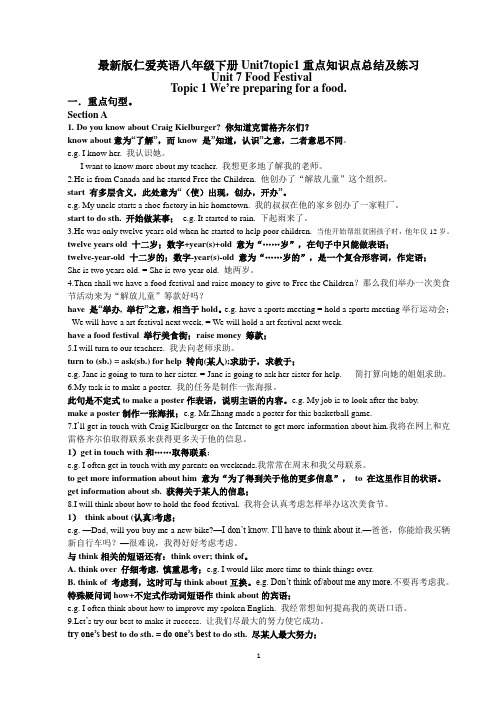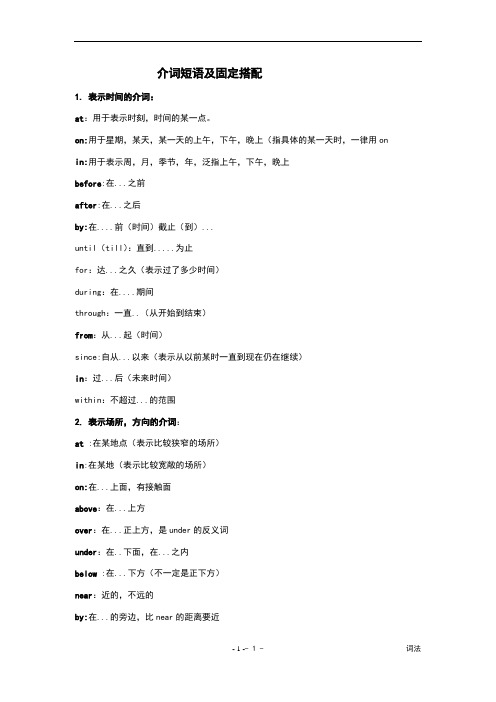in_hospital和in_the_hospital的区别
最新版仁爱英语八年级下册Unit7topic1重点知识点总结及练习--最新版

最新版仁爱英语八年级下册Unit7topic1重点知识点总结及练习Unit 7 Food FestivalTopic 1 We’re preparing for a food.一.重点句型。
Section A1.Do you know about Craig Kielburger? 你知道克雷格齐尔们?know about意为“了解”,而know 是”知道,认识”之意,二者意思不同。
e.g. I know her. 我认识她。
I want to know more about my teacher. 我想更多地了解我的老师。
2.He is from Canada and he started Free the Children. 他创办了“解放儿童”这个组织。
start 有多层含义,此处意为“(使)出现,创办,开办”。
e.g. My uncle starts a shoe factory in his hometown. 我的叔叔在他的家乡创办了一家鞋厂。
start to do sth. 开始做某事;e.g. It started to rain. 下起雨来了。
3.He was only twelve years old when he started to help poor children. 当他开始帮组贫困孩子时,他年仅12岁。
twelve years old 十二岁;数字+year(s)+old 意为“……岁”,在句子中只能做表语;twelve-year-old 十二岁的;数字-year(s)-old 意为“……岁的”,是一个复合形容词,作定语;She is two years old. = She is two-year old. 她两岁。
4.Then shall we have a food festival and raise money to give to Free the Children?那么我们举办一次美食节活动来为“解放儿童”筹款好吗?have 是“举办, 举行”之意,相当于hold。
in the的用法口诀

in the的用法口诀一、介绍"In the"的用法在英语中,使用介词是非常常见的一种语法现象。
而其中,介词"in"的用法尤为广泛和多样。
今天我们就来学习一下关于"in"的一些常见用法和口诀。
二、in 表示位置或空间1. in表示在某个地方或位置上。
例如:in the park (在公园里), in my room (在我的房间里)。
2. in表示与周围环境有接触。
例如:in the water (在水里),in the air (在空气中)。
3. in表示位于容器或物体中。
例如:in a box (在盒子里),in a car (在车内)。
三、in 表示时间1. in + 年代/季节:in 2010(在2010年),in summer(在夏季)。
2. in + 时间段/时期:in the morning(早晨),in two weeks(两周后)。
3. in + 具体日期:in July 5th (7月5日), in Christmas Day(圣诞节)。
四、特殊短语及注意事项1. 在某个范围内: in my opinion(依我看), in general(一般来说)。
2. 在进行某个活动时使用特定工具:write something down on paper(把东西写到纸上)。
3. 不加冠词:in bed(在床上),in hospital(在医院)。
4. 注意"in"和其他介词的区别:- in the room(在房间里),on the table(在桌子上),under the chair(在椅子下)。
五、总结通过学习本文所述的"In the"的用法,我们可以更准确地运用这一小单词。
记住口诀并不难,只要不断练习和运用,在日常表达中就能得心应手。
熟能生巧,相信大家很快就能灵活掌握"in"的正确用法了!。
介词短语及固定搭配

介词短语及固定搭配1. 表示时间的介词:at:用于表示时刻,时间的某一点。
on:用于星期,某天,某一天的上午,下午,晚上(指具体的某一天时,一律用on in:用于表示周,月,季节,年,泛指上午,下午,晚上before:在...之前after:在...之后by:在....前(时间)截止(到)...until(till):直到.....为止for:达...之久(表示过了多少时间)during:在....期间through:一直..(从开始到结束)from:从...起(时间)since:自从...以来(表示从以前某时一直到现在仍在继续)in:过...后(未来时间)within:不超过...的范围2. 表示场所,方向的介词:at :在某地点(表示比较狭窄的场所)in:在某地(表示比较宽敞的场所)on:在...上面,有接触面above:在...上方over:在...正上方,是under的反义词under:在..下面,在...之内below :在...下方(不一定是正下方)near:近的,不远的by:在...的旁边,比near的距离要近between:在两者之间among:在三者或者更多的之中around:环绕,在...的周围,在....的四周in front of:在...的前面behind:在...后边in:在..之内,用于表示静止的位置into:进入out of :和into一样,也表示有一定的运动方向along:沿着across:横过(平面物体)through:贯通,通过to :达到..地点(目的地)或方向for:表示目的,为了.....from:从...地点起3. 其他介词with:和..在一起;具有,带有;用某种工具或方法in:表示用什么材料(例如:墨水,铅笔等)或用什么语言。
表示衣着.声调特点时,不用with而用in。
by:通过...方法,手段of:(属于)...的,表示...的数量或种类from:来自(某地,某人),以...起始without:没有,是with的反义词like :像...一样as :作为;担任;当... ...时against:反对,靠着about:关于,各处,四周;询问某人,某物的情况或提出建议4.介词和各类词搭配构成的介词短语1)介词与动词搭配arrive in/at到达ask for要,请求do well in在……方面做得好give in投降go on 继续hear from收到……来信 hear of听说help sth.帮助……做laugh at嘲笑 learn from向……学习leave for离开一地去另一地talk to与……谈话 go in for从事,致力于put up穿上,挂上 take down拿下,取了look at(有意识地)看 speak to对某人说send for派人去请shout at大声叫喊,吼叫take away拿走,带走think of考虑,关心turn into把……变成wait for等候,等待take off脱下,起飞turn on/off打开(关上)listen to听look after照顾,照看look for寻找 look like 看上去像get to 到达 point to 指着……fill with充满,装满 begin with以……开始deal/do with处置,对待meet with偶尔遇见,遭遇 pass on传递belong to属于write to写信给……call on号召,访问,邀请die of死于…… depend on依靠,依赖smile at向……微笑 believe in信任look out向四下看,到处看2)介词与名词搭配with a smile带着微笑at night在晚上 at noon在中午at hospital在医院at home在家at first首先,起初at last最后,终于at the meeting在会上 at least至少in surprise惊奇地 at once立刻,马上at the foot of在……脚下at all压根儿at dinner在吃正餐 at the table在桌子旁at work在工作at school在学校at the back of在……后面at the moment 此刻at the beginning of在……开始 at the end of在……结尾at the same time同时,然而by hand用手,手工,亲手 by the end of到……结束时by train乘火车by bus乘公共汽车day by day日复一日one by one一个接一个 by spaceship乘坐宇宙飞船by the way顺便说说/问问in a low voice大声地in a word总而言之,一句话in trouble处于困境in fact事实上in the street在街上in the end最后,终于in space在空间 in no time立刻,很快in order按顺序,整齐,正常in order to为了,以便in the day在白天in line成一直线in a short while不久in all总共,总计 in town在城里in silence不作声in time及时 in bed卧床in life一生中in front of在……前面 in a hurry匆忙,急忙in a minute一会儿in English用英语 in the middle在中间 in the sun在阳光下in a tree在树上out of breath上气不接下气out of sight消失,看不见on time准时,按时on duty值日on the left/right在左/右边on one’s way to在……的路上on foot 步行on the one handon the other hand一方面……另一方面on the other side of在……的另一边on the radio通过无线电广播to this day直到今天to one’s surprise/joy使某人吃惊/高兴3)介词与形容词、过去分词和动词等搭配be born in出生于……be good at擅长……be made of由……制成be angry with sb. 对某人生气be angry at sth. 为某事生气be pleased with sb. 对某人感到满意be satisfied with sth.对某事感到满意be surprised at对……感到惊奇/诧异be tired of讨厌……/厌倦……be interested in对……感兴趣be proud of以……为自豪/骄傲be full of充满…… take/catch hold of抓住be sure of确信…… take part in参加break into 闯入take care of照顾,关心,保管be busy with忙于……be strict with对……严格要求catch up with跟上,赶上 have nothing to do with与……无关go to school上学 go to bed/sleep睡觉give a lesson to给……上课go to the cinema 去看电影be kind to sb. 对某人友好say hello to向……问好look forward to盼望,期待keep out of不让进入 go on strike罢工be used to习惯于……5.看似相同,但意义有别的词组:1)介词词组(1) at table在进餐at the table在桌子旁(=beside the desk)(2) at desk在读书或做作业at the desk在书桌旁(3) at school在校上学(指学生)at the school在学校(指教职工)(4) in front of the bus在公共汽车的前面(不在车上)in the front of the bus在公共汽车的前部(在车上)(5) at sea在航海中at the sea在海边(6) by day白天by the day按日,论日(7) behind time误期behind the time落后于时代(8) in class在上课,在课内in the class在这个班(9) in bed 卧床,在睡觉in the bed在床上(10) in prison坐牢in the prison在监狱(11) in red穿着红色的衣服in the red负债,亏损(12) in hospital住院(指病人)in the hospital(因事)在医院(13) in office在办公,执政in the office在办公室(14) in secret秘密,私下in the secret参入秘密,参入阴谋(15) in place of 代替,而不是in the place of在……地方(16) in case of万一,如果in the case of就……来说,至于(17) of age成年人of an age同龄人(18) out of office离职out of the office离开办公室(19) out of prison(因犯罪)出狱out of the prison(因事)从监狱出来(20) out of question毫无疑问out of the question不可能,办不到2)含有介词的动词词组(1) come out of hospital(病好)出院come out of the hospital(因事)从医院里出来(2) come out of prison(刑满)释放come out of the prison(因事)从监狱里出来(3) go to school去上学 go to the school(因事)去学校(4) go to college上大学 go to the/a college去一所学校(办事)(5) go to bed上床睡觉 go to the bed去床边(6) go to hospital去住院 go to the hospital(因事)去医院(7) go to prison去坐牢 go to the prison(因事)去监狱(8) go to sea当海员 go to the sea去海边(9) go to court起诉 go to the court(因事)去法庭(10) go to church做礼拜 go to the church(因事)去教堂(11) keep house管理家务 keep the house守在家里(12) take place发生 take the place代替3)有无冠词,意义无多大区别的介词词组(1)at(the)most至多 (2)at(the)first起初 (3)all(the)day 整天(4)catch(a)cold感冒 (5)in(the)future 将来 (6)in(the)memory of纪念(7)go to(the)office 上班,去办公室 (8)go to(the)market 赶集,去市场(9)on(a)holiday 在度假(10)(the)day before yesterday 前天(11)(the)most of 大多数必背短语1)at once 立刻 2)at last 最后3)at first 起先,首先4)at the age of… 在……岁时5)at the end of… 在……之末6)at the beginning of… 在……之初7)at the foot of… 在……脚下 8)at the same time 同时9)at night/noon 在夜里/中午10)with one's help 在某人的帮助下,由于某人的帮助11)with the help of … 在……的帮助下12)with a smile 面带笑容 13)with one's own eyes 亲眼看见14)after a while 过了一会儿15)from now on 从现在起 16)from then on 从那时起17)far example 例如 18)far away from 远离19)from morning till night 从早到晚20)by and by 不久 21)by air mail 寄航空邮件22)by bike/air/train/bus 骑自行车/乘飞机/火车/汽车 23)by ordinary mail 寄平信24)by the way 顺便说 25)by the window 在窗边26)by the end of… 到……底为止 27)little by little 逐渐地28)in all 总共 29)in fact 事实上30)in one's twenties 在某人二十几岁时 31)in a hurry 匆忙32)in the middle of 在……中间 33)in no time (in a minute) 立刻,很快34)in time (on time) 及时 35)in public 公众,公开地36)in order to 为了…… 38)in the sun 在阳光下39)in the end 最后,终于 40)in surprise 惊奇地41)in turn 依次42)of course 当然 43)a bit (of) 有一点儿44)a lot of 许多 45)a little 一点儿46)on one's way to 某人在去……的路上 47)on foot 步行,走路48)a talk on space 一个关于太空的报告 49)on the other hand 另一方面50)at/on the weekend 在周末 51)on the left (right) 在左(右)边52)on the other side of 在……另一边 53)on the radio 通过收音机(无线电广播)。
定冠词the的用法大盘点

定冠词the的用法大盘点来源:微信号中国日报网双语新闻(Chinadaily_mobile)The是一块砖,哪里需要哪里搬,童鞋们经常看见名词就加the,反正有就更好,没有也无伤大雅。
殊不知,你们作文里满屏的the是外教最头痛的事。
双语君就记得学生时代,外教总说我们滥用the。
痛定思痛,双语君决定来和大家一起梳理一遍定冠词the(definite article)的用法。
一.这些词前不能加the考虑到the经常被滥用,我们先说说不能加the的情况。
1.抽象意义◆有些物质名词和抽象名词前永远用零冠词(Zero article,即不适用任何冠词),即使有形容词,也用零冠词。
常见的有:weather, progress, fun, advice, news, information, luck, furniture, wealth, honesty 等。
注意:man 表示“人类”和word 表示“音讯”时一般不加冠词,如:➤It is well known that man has a very close relationshipwith environment.众所周知,人类与环境关系非常密切。
➤Word has it that the food costs an arm and a leg.听说那里的食物贵得离谱。
◆表示抽象概括意义时,不可数名词和复数名词使用零冠词,例如:➤Books are my best friends.书是我的好朋友。
➤Love is all you need.你需要的只是爱。
◆表示一种抽象的状态,比如to/at sea, to/at/out of work, in/out of town, in/out of office等。
➤He used to spend several months at sea.他曾出海几个月。
➤I go to work every day. I was at work yesterday.我每天上班。
雅思听力冠词盘点【不定冠词+定冠词+零冠词】

雅思听力冠词盘点【不定冠词+定冠词+零冠词】在雅思听力备考中考生如何快速理解听力内容,首先需要有一个好的词汇基础,下面店铺为大家分享雅思听力冠词盘点【不定冠词+定冠词+零冠词】内容,方便在备考中学习与积累。
雅思听力冠词盘点【不定冠词+定冠词+零冠词】不定冠词:1. a用于辅音发音开头的词前, 如:a book; an用于元音发音开头的词前,如:an apple, an hour. 请区别:a useful machine, an umbrella, a “u”, an “h”。
1. a/an 用于单数可数名词前。
a book a boy a man a bird a dog an houran interesting book a big dog a dangerous aminal【练习】判断正误:a story( ) a bread ( ) a paper( ) a bag( )a pretty woman( ) a school ( ) a useful book ( )2.表示类别:这种用法是指某人或某物属于某一种类,或者指某一种类的人或物中的任何一个或一件,或者指某一种类的人或物,但不具体说明是何人或何物。
例如:That is a pen, not a pencil. 那是钢笔而不是铅笔。
(指属于某一种类)Give him a pear, please! 请给他一个梨。
(指某一种类中的任何一个)Listen! A boy is singing in the classroom.3.和 one 的区别: a/an 表示类别种类 One 强调数量a bus (表示是一辆公交车而不是一辆小汽车也不是火车)one bus (强调是一辆车而不是两辆或三辆)There is a cat under the chair. 椅子下面有一只猫。
(强调种类) There is one cat under the chair.椅子下边有一只猫。
新概念英语-第二册Lesson-33

Ahead 是副词,意思为 “在前面〞,在这里作 后
置定语,修饰light. Go ahead of her.〔走在她的前面。〕是一种动 态。而如果是静态的表示“在…之前〞,我们就
2.What did the girl do when the boat struck a rock?
She jumped into the sea.
3.How many miles did she swim that night?
She covered a distance of eight miles.
石
2-Listening and Reading
Questions on the test
1.What happened after the girl set out from the coast in a small boat one afternoon? She was caught in a storm.
land at the edge of a sea or lake) 是这三个词中最普通的一个,可指湖、 海等的岸:
the western shore of the Pacific 太平洋西岸
5、During that time she covered a distance of eight miles.
3、Towards evening, the boat struck a rock and the girl jumped into the sea.
rock n. 岩石,礁石;摇滚乐 山脉是由岩石构成的。 Mountains are made of rock. rock and roll 摇滚乐,摇滚舞
初一英语上各模块知识点

• 注意:如果指示代词this/that在问句中指人,那么回答 时一定用it,而不用指人的主格。Eg:Is this/that
your mother? Yes.it is./ No, it isn’t.
•
Unit2知识点
• Unit2知识点
• 1 有的动词变名词是在动词后加er, 以不发音的字母e结尾的,
• 4 go+动名词,表示“去做。。。” go shopping/ swimming/ fishing
• 5 so 与because .两者不能同时出现在一个句子中。 eg: Tom can’t come to school because he is ill.=Tom is ill, so he can’t come to school.
• 四、句式变换:1否定句:在be 后加not .2 一般疑问句:把be 提前。
• Eg: There isn’t a pen on the desk.
• isn’t. Is there a pen on the desk? Yes, there is./No, there
• 注意:肯定句中的some在否定和疑问句中变any.
只加r
teacher/worker/farmer/reader/writer
• 2 in/at hospital与in/at the hospital 的区别:前者指病 人住院,后者指在医院里,不是病人。Eg: Tom is ill in hospital. 汤姆生病住院了。Tom is a doctor in the hospital,汤姆在医院里是一个医生。
•3(1)在几年级几班级用in.
•(2)班级+数
Class Three
Unit 7 topic 1 重点知识点总结

Unit 7 Topic 1 Section A1.Do you know about Craig Kielburger? 你知道克雷格齐尔伯格?know about意为“了解”,而know 是”知道,认识”之意,二者意思不同。
如:I know her. 我认识她。
I want to know more about my teacher. 我想更多地了解我的老师。
2. He is from Canada and he started Free the Children. 他创办了“解放儿童”这个组织。
start有多层含义,此处意为“(使)出现,创办,开办”。
如:My uncle starts a shoe factory in his hometown. 我的叔叔在他的家乡创办了一家鞋厂。
start to do sth.开始做某事;如:It started to rain. 下起雨来了。
3. He was only twelve years old when he started to help poor children. 当他开始帮组贫困孩子时,他年仅12岁。
twelve years old十二岁;数字+year(s)+old 意为“……岁”,在句子中只能做表语;twelve-year-old 十二岁的;数字-year(s)-old 意为“……岁的”,是一个复合形容词,作定语;4. Then shall we have a food festival and raise money to give to Free the Children?那么我们举办一次美食节活动来为“解放儿童”筹款好吗?(1) have 是“举办, 举行”之意,相当于hold。
have a food festival =hold a food festival 举行美食节;如:have a sports meeting = hold a sports meeting举行运动会;(2) Shall I/we …? 在提供帮助、提出建议、要求给予和征求意见时,用Shall I/we …?句型,意为“我(们)……,好吗?”如:Shall I open the window? 我把窗户打开好吗?【链接】①May I …? 常用于征求对方的意见,意为“我可以……吗?”。
- 1、下载文档前请自行甄别文档内容的完整性,平台不提供额外的编辑、内容补充、找答案等附加服务。
- 2、"仅部分预览"的文档,不可在线预览部分如存在完整性等问题,可反馈申请退款(可完整预览的文档不适用该条件!)。
- 3、如文档侵犯您的权益,请联系客服反馈,我们会尽快为您处理(人工客服工作时间:9:00-18:30)。
in hospital和in the hospital的区别
英语与汉语的明显区别之一就在于英语中有冠词。
而且冠词还在英语中发挥重要的作用。
有无冠词,定冠词还是不定冠词,都会影响一个短语甚至一个句子的意思。
比如英语中的in hospital与in the hospital的意思就非常不同。
in hospital的意思是“住院”。
没有定冠词the的限制,hospital是一个抽象名词,所以in hospital 整个短语的意思是相对宽泛含义的“住院”
而in the hospital的意思则是“在医院”,可能是到医院工作,可能是看护病人,由于有了定冠词the的限制,the hospital成为了一个具体指某个地点的名词,所以in the hospital的是指在医院这个地方。
一. in,on在方位名词前的区别
1. in表示A地在B地范围之内。
如:Taiwan is in the southeast of China.
2. on表示A地与B地接壤、毗邻。
如:North Korea is on the east of China.
二. at, in, on在表示时间上的区别
1. at指时间表示:
(1)时间的一点、时刻等。
如:
They came home at sunrise (at noon, at midnight, at ten o’clock, at daybreak, at dawn).
(2)较短暂的一段时间。
可指某个节日或被认为是一年中标志大事的日子。
如:
He went home at Christmas (at New Year, at the Spring Festival, at night).
2. in指时间表示:
(1)在某个较长的时间(如世纪、朝代、年、月、季节以及泛指的上午、下午或傍晚等)内。
如:in 2004, in March, in spring, in the morning, in the evening, etc
(2)在一段时间之后。
一般情况下,用于将来时,谓语动词为瞬间动词,意为“在……以后”。
如:He will arrive in two hours.
谓语动词为延续性动词时,in意为“在……以内”。
These products will be produced in a month. 注意:after用于将来时间也指一段时间之后,但其后的时间是“一点”,而不是“一段”。
如:He will arrive after two o’clock.
3.on指时间表示:
(1)具体的时日和一个特定的时间,如某日、某节日、星期几等。
如:
On Christmas Day(On May 4th), there will be a celebration.
(2)在某个特定的早晨、下午或晚上。
如:He arrived at 10 o’clock on the night of the 5th. (3)准时,按时。
如:If the train should be on time, I should reach home before dark.
三. at, in和on表示地点时的区别
1. at表示地点:
(1)用于指较小的地方。
如:I shall wait for you at the station.
(2)用于门牌号码前。
如:He lives at 115 Zhongshan Road.
2. in表示地点:
(1)用于指较大的地方。
如:He lives in Shanghai.
(2)虽然是很小的地方,如果说话人住在那里,也可用in。
商店、学校、机关等,若看作一个地点(point)用at,若看作一个场所(place)用in。
如:
I met him at the post-office.
I’m now working in the post-office.
3. on表示地点,一般指与面或线接触,意为“在……上;在……旁”。
如:
The picture was hanging on the wall.
New York is on the Hudson River.。
